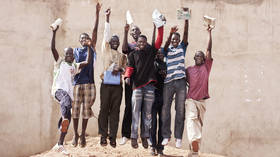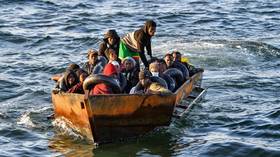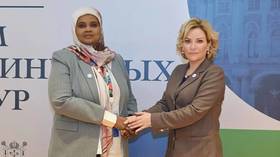Africans are increasingly learning Russian. Why?
Although cooperation declined in the years after the collapse of the USSR, Moscow is now returning to the continent, and so is the language
Many Africans learned Russian while studying in Soviet universities, and though cooperation between Moscow and the continent declined in the years after the collapse of the USSR, Russia is now returning, and so is the language.
The ideas and values of Russia are close to the hearts of many Africans. This may explain the growing interest in the Russian language, which, according to the Pushkin State Russian Language Institute, is spoken by 255 million people worldwide as of 2022, and is the second most frequently used language for web content after English.
The Soviet Union laid a solid foundation for cooperating with African countries – in fact, without this basis, any major partnership would be impossible today. The USSR educated an entire generation of highly-skilled specialists who formed Africa’s new elites. Because of this, Africa has long considered Russia to be a provider of excellent (and inexpensive) higher education.
Soviet solutions to African problems
The decision to train specialists from African countries was part of the Soviet Union’s long-term strategy. To help educate young people from Africa and other world regions, the Peoples’ Friendship University was established in 1960. A year later, the institution was named after Patrice Lumumba – the national hero of the Democratic Republic of the Congo, who became a symbol of Africa’s anti-colonial struggle after he was brutally assassinated (with the help of the CIA and the Belgian State Security Service) in 1961.
The establishment of the People’s Friendship University was part of the Soviet Union’s effort to help its African partners, who had just broken the yoke of colonialism. At the time, there were only 25 universities throughout Africa, and the scientific and pedagogical environment in these institutions was only starting to develop. As a result, representatives of the African elites were mostly educated in Western universities.
African students went to the USSR to acquire an in-demand profession that would allow them to make a rapid ‘social leap’ when they returned home. This is why the most popular areas of study for African students were engineering, technology, and agriculture. At one point, over 14% of foreign graduates from Soviet universities were Africans.
Almost 90% of all graduates of African descent completed their university studies, while the remaining 10% graduated from secondary vocational schools. In addition to theory, they also studied the practical aspects of working with Soviet equipment, which helped them to become indispensable specialists in their homeland.
From 1960-1992, the Soviet Union trained over 40,500 specialists from sub-Saharan Africa. Most graduates (49%) studied at institutions in the Russian Soviet Federative Socialist Republic (RSFSR); others were trained in the Ukrainian SSR.
All these people spoke Russian, since students from African countries had to take preparatory language courses for one year. This was the main advantage of Soviet education.
Nevertheless, there was a problem since few of these people passed on their language skills to others. When they returned home, many graduates gradually forgot the language due to a lack of practice. Some complained about the lack of programs allowing them to maintain their language skills. Moreover, less than 1% of the graduates majored in Russian Studies. Most went on to work in the field of economics, where they never had to speak Russian.
However, for many Africans, the exciting years of study in the Soviet republics overshadowed any shortcomings. Many remember their studies with affection and some even consider Russia their second homeland.
Why are Africans learning Russian today?
In recent years, the number of students majoring in Russian has increased and is around 10% compared with other specialties. In Africa itself, there are now more opportunities to learn Russian. While in some African countries, Russian is not taught in universities, in others it is taught in public schools. Russia’s Federal Agency for the Commonwealth of Independent States Affairs, Compatriots Living Abroad, and International Humanitarian Cooperation (Rossotrudnichestvo) helps out in those countries where the language is not very popular.
‘Russian Houses’ are now open in eight African countries (Tunisia, Morocco, Egypt, Ethiopia, Tanzania, Zambia, South Africa, and the Republic of the Congo). By 2025, Russian Centers of Science and Culture (RCSC) will open in Algeria, Angola, and Mali, based on agreements with local NGOs. In Egypt, there are already two Russian Houses and one RCSC. The Culture Centers provide language courses for students who plan to enroll in Russian universities. According to the latest data, about 2,000 people have already completed these courses.
The popularity of Russian and the preparatory courses is directly tied to the scholarships provided for foreign students who want to study in Russian universities. Rossotrudnichestvo’s press service reported that last year, the average competition to receive a scholarship was about five people per place, so in the 2023-24 academic year, the number of scholarships was doubled from 2,300 to 4,700. Guinea, Angola, Mali, the Republic of the Congo, Egypt, and Nigeria are among the countries that receive the biggest financial benefits.
However, many students face difficulties in learning the language, despite the preparatory courses. Russian is a very complex language, and even though the classes last for one year, most students are not able to freely speak the language and study in a Russian-language environment after completing the courses.
In Senegal, young people can start learning Russian as a second language in vocational school or high school. However, as Kasse Abdou Fata, a graduate of the Pushkin State Russian Language Institute notes, this is not enough to master the language. “There is no Russian-speaking environment in Senegal that would allow one to quickly master such a complex language, so even after several years of studying it in vocational school or high school, students from Senegal have to take preparatory courses for another year after arriving in Russia,” he said.
In the past, African students rarely chose Russian as a second language. Sometimes they enrolled in the Russian studies program merely by chance. The students often had a very poor understanding of Russia and the joint Russia-Africa projects.
This lack of interest was due to the fact that students who majored in Russian did not have career prospects in Africa – there were very few Russian companies in Africa, and as a result, the demand for translation services was also low. Moreover, Russian language students in African universities often did not have the chance to visit the country. Young graduates would start teaching the language, even though they had never been in a Russian-speaking environment or never had the chance to become familiar with the culture. This situation particularly impacted students from areas where the language was not taught (or was taught poorly) in secondary schools.
“But as more and more representatives of Russian businesses came to Africa and relations between Russia and Senegal developed, young people began actively learning Russian… Russian-speaking candidates have an advantage when applying for work in a Russian company,” Kasse Abdou Fata told RT.
As a rule, Russian companies in Africa recruit employees who speak English or French, and these languages are used in the course of work. However, specialists who have lived in Russia for at least four years are more likely to become loyal employees who will show interest in their work and concern for the company. For this reason, Russian-speaking candidates are more likely to get the job, and this is a major motivation for young Africans.
The situation is similar in Mali. “In all the regions of Mali, except the northern ones, Russian is taught as a second foreign language in public schools, and also in some private ones. The number [of Russian language students] is small – sometimes there are fewer than 10 students per school. However, as a result of the growing cooperation between Russia and Mali, the number of students who decide to major in Russian in university and those who want to study it as a second foreign language in schools is gradually increasing,” the head of the Department of the Russian Language at the University of Literature and Humanities, Dr. Gaoussou Samake, told RT.
The growing demand for Russian is not just related to employment opportunities. Many Africans are interested in visiting Russia and studying in Russian universities. “For a long time, there was an agreement between the University of Bamako and the Pushkin Russian Language Institute which allowed Malian students to enroll in bachelor’s degree programs in Russia. This greatly increased the popularity of the Russian language among the applicants, and when this tradition ceased to exist, many of them chose other specialties,” Samake explained. But Russia remembers its African partners and the growing cooperation has already given rise to positive trends.
The Russian language returns to Africa
At the Russia-Africa Summit in St. Petersburg, Russian President Vladimir Putin focused attention on efforts to popularize Russian and cooperation in the field of education. The current partnership level must be improved, so the plans for the future are quite ambitious.
One of the major goals is to create an international organization for the Russian language. Russian-speaking countries and others which appreciate the culture and language, and want to encourage the use of Russian in business and everyday life, will be able to join the organization. Putin invited African partners to join the organization, which will begin operating in 2024. In addition to global projects, Russia is also implementing local, practical initiatives.
Various Moscow-based and regional universities have launched a considerable number of projects aimed at popularizing the Russian language in Africa. Over the past few years, Russia has also provided generous funds to help African students, teachers, and graduates visit the country.
In addition to exploring Russian culture, participants of the program attend language classes and have the chance to immerse themselves in the environment. When studying a foreign language, nothing beats the experience of visiting the country where it is spoken. Africans who are already somewhat familiar with Russian culture can feel its diversity and scope, and can ‘try on’ the Russian lifestyle for a while. On returning home, these people proudly share their experience of traveling to Russia and pass on their language skills to their peers and students.
Putin also suggested that every African should have the opportunity to visit Russia without leaving home. In his speech at the summit, he proposed opening schools in Africa where subjects would be taught in Russian. Moreover, the three-year action plan of the Russia-Africa Partnership Forum includes the goal of opening branches of Russian educational organizations on the African continent.
The Russian Teacher Abroad program is a global project aimed at improving the quality of teaching the language. The project extends to Africa, and many African countries have already joined it; 28 African countries are also in the process of creating Open Education Centers for training preschool, primary, and secondary school teachers.
Today, the friendship between Russia and Africa is stronger than ever. Although cooperation declined in the years after the collapse of the USSR, Moscow is now returning to Africa, and so is the Russian language. And the people of Africa welcome them with an enthusiastic ‘spasibo’!








Comments are closed.